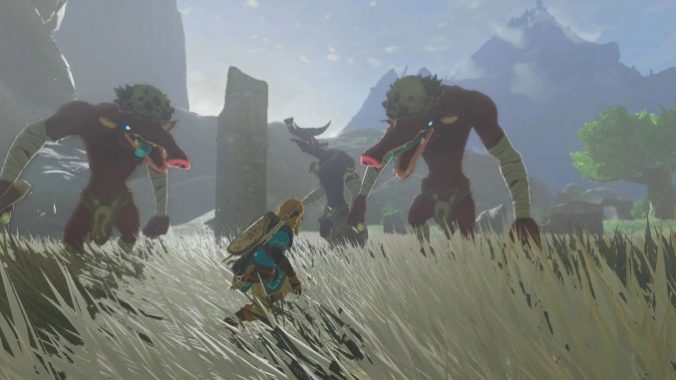Lately I feel my most curmudgeonly around the release of a watershed videogame release. This seeming grumpiness doesn’t always align with how I truly feel, though—it’s just that videogames have become so omnipresent that it’s difficult to dodge these conversations in several spheres of life. Over the last few years, games like God of War, Horizon Forbidden West, and, unfortunately, that godforsaken wizard game have become water cooler topics, easy subjects to broach because of how shared the experience has become and because of the prevalence of marketing.
This rise has correlated (perhaps coincidentally, perhaps not) with a deep burn out I’ve felt with major releases. I’ve shied away from the hype cycle more and more. Recently, I’ve realized this has become essential to my own mental wellness and personal life; gamers often buck against conversations surrounding the unhealthy aspects of gaming, the ways in which adopting it as your main hobby colors your relationship with yourself, how it mediates your social life, your time management, and even the way you holistically view media.
When I’m at my most invested in what’s going on in the industry, I’m also at my most caustic. My opinions skew dogmatic, and when I don’t see what I want in a game I’m excited for, I become more irate than I might with a disappointing movie or book. Videogames are, even more than most forms of mass media, a product. They are focus grouped and marketed to a minute level in hopes of delivering the most satisfying experience to the widest audience. This isn’t a particularly novel observation, but it does explain why games increasingly can feel like junk food, empty calories that scratch a basic itch for completionism and rote organization present in many.
But this isn’t exactly the kind of thing you can just reveal to someone, the chaotic unrest you feel when these huge games are on the horizon. It’s grouchy. Whiny, even! Games are, obviously, something you do not have to play to be happy or live a normal life. There’s a world of other hobbies to engage in out there. But games are also something I do love (or at least I think I do). This makes these complicated feelings difficult to deal with when approached with a simple, friendly conversation starter: “Are you excited for Tears of the Kingdom?”
Just thinking about the question is enough to send chills down my spine, to cringe before I can even come up with a good answer. Breath of the Wild was a fun time the first time through, but not something I’ve ever felt the desire to revisit. As Tears has slowly rolled out, I realized that, even though I’ve played every Zelda game thus far, I probably wouldn’t be playing it. This isn’t a knock against the game by any means—from what I can glean, it’s a true achievement in physics and emergent gameplay. No two people seem to have the exact same experience, and there’s a beauty in that. But Tears doesn’t represent what I want to feel in a game, and so I decided to amiably opt out.
The thing is, marketing makes it extremely hard to do this. The constant advertisements—YouTube ads, inlays, even on billboards—has made Tears of the Kingdom nearly impossible to avoid. By my wager, it might have the most successful ad campaign in gaming thus far because the game itself generates ad content. Since the release of Breath of the Wild, the game has enjoyed a very active fanbase of creators who share and post insane gameplay highlights online. It’s become a popular joke that a certain elite group of players have been playing Tears for years because of their innovative use of the first game’s mechanics. Breath proved it had true staying power during a (still ongoing) era of all media being consumed, chewed up, and spat out for the next big thing with rapidity. Tears of the Kingdom smartly honed in on these elements that made Breath preternaturally appealing by giving players a new toolset that allows for an even broader sandbox. It’s a toylike experience that is equally as hard to create as it is to replicate, hence why gameplay clips have become even more commonplace—players are eager to show off their bizarre vehicle creations and Looney Tunes-esque shenanigans, which generates further buzz for the game.
Tears of the Kingdom was an ironclad titan of the current gaming climate before it even came out, but the discourse has made it truly unassailable. It’s not a game whose merit you can simply debate away. Far be it from me to try! And yet, I can’t help but feel a certain queasiness when the game comes up. Its omnipresence instills a deep fear in me, because I don’t want to be the one to say I’m not interested if and when it comes up. I’m still learning how to navigate these conversations. I never want to engage in a bad faith conversation where my opinion on something as ultimately trivial as a videogame can seem scornful. But I also want to protect myself from the forcible FOMO the hype train is meant to generate.
There’s not really any one person (or company) to blame for this. The aspects of gaming that I can’t square away with myself are my own business, and it’s always a journey to advocate for yourself and develop healthier, responsible habits. I know what I should and shouldn’t engage with to keep myself on the right track. How to do that without sounding absurd is the hard part.
Austin Jones is a writer with eclectic media interests. You can chat with him about horror games, electronic music, Joanna Newsom and ‘80s-‘90s anime on Twitter @belfryfire
